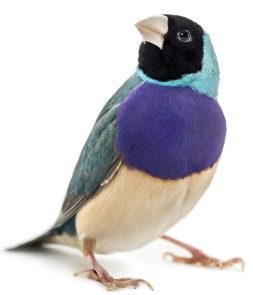
Breeding Season A specific season of the year in which a species will usually breed to ensure that offspring are produced only at a certain time of the year. Usually spring or autumn/fall.
Brood Parasite
Brood parasites are birds that rely on others to raise their young. Eggs are deposited into the nest of a host species, who then hatches and raises the young – often to the detriment of their own eggs.
Clutch
All the eggs laid in a nest by a pair of birds at a single time. When hatched, that collection of offspring form a “clutch” of young.
Colony
A group of three or more pairs of birds of the same species who share a single aviary.
Colony Breeding
Housing three of more pairs of a single species in one aviary, often to minimize space consumption or encourage cooperative rearing of young.
Courtship Display
A dance-like ritual, display or chase that a bird (typically the male) will use to attract a mate of the opposite sex.
Egg Binding
A condition in which an egg becomes stuck in the hen’s vent, usually caused by out-of-season breeding, cold weather, or poor nutrition. Can be fatal if not treated immediately.
Fledge
“Fledging” occurs when a chick leaves the nest for the first time.
Fledgling
A young bird that has only recently fledged. It is typically still dependent on its parents for food and protection.
Hatchling
A chick that has only recently hatched from an egg.
Live food.
Insects. Usually refers to mealworms, termites, small cockroaches, and/or maggots.
Mixed Collection
A name given to a cage or aviary that contains multiple different species of bird. Finches are most commonly housed in this manner.
Moult (Molt)
The process by which a bird sheds its feathers and replaces them with new ones. Often occurs seasonally, yearly, or every few years.
Moxidectin
A commonly used worming and parasite control chemical.
Mutation
A feather color variation that has developed through selective breeding. Some are naturally occurring.
Nest Inspection
The act of looking inside a bird’s nest to observe eggs or young. Can cause some birds to abandon the nest.
Nesting Material
A material, typically grass, that is provided to birds for the purpose of nest construction.
Pure Normal
A bird that possesses no color mutation and contains no mutation genes. Often the offspring of recently wild-caught birds, but sometimes achieved through careful breeding and meticulous genealogical record-keeping.
Sexing
Determining the gender of a bird using visual or behavioral cues. Some species require a DNA test to accurately sex.
Wild Type
A bird that is visually identical to wild birds of the same species. Often used interchangeably with ‘pure normal.’
Worming
The process of administering preventative medicine to eradicate parasitic worms. Typically done seasonally or annually.